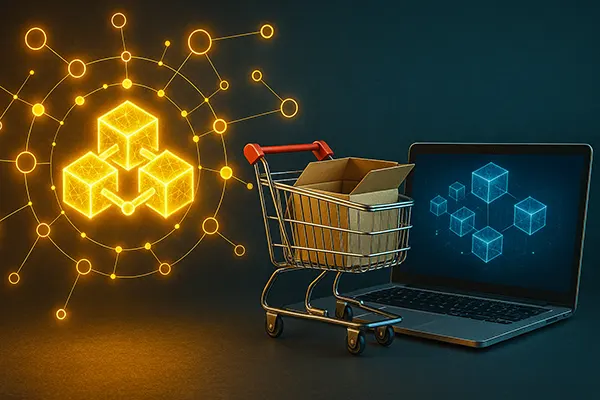Blockchain in E-commerce: From Smart Contracts to Product Provenance Tracking
Blockchain has become a transformative technology in e-commerce, reshaping how transactions are processed, how trust is established between sellers and buyers, and how products are tracked across global supply chains. By offering transparency, immutability, and decentralisation, blockchain provides solutions to long-standing issues such as fraud, counterfeit goods, and inefficiencies in order fulfilment. In 2025, its integration into e-commerce continues to expand, driven by consumer demand for security and authenticity.
Smart Contracts in E-commerce
Smart contracts are self-executing digital agreements built on blockchain technology. In e-commerce, they eliminate intermediaries by automating payment settlements, refund processes, and delivery confirmations. This creates a faster and more reliable transactional flow, reducing costs and minimising disputes.
One of the major benefits of smart contracts is their transparency. All terms are recorded on the blockchain and cannot be altered, ensuring that both parties understand the conditions before engaging in a transaction. This is particularly valuable in international trade, where contractual misunderstandings can be costly.
In 2025, businesses are increasingly using smart contracts not only for payments but also for automated inventory management and supplier agreements. This allows companies to streamline logistics, reduce manual oversight, and strengthen trust with their partners.
Challenges and Future Outlook
Despite their advantages, smart contracts face challenges. Legal recognition varies across jurisdictions, and disputes involving cross-border transactions can still be complex. Additionally, coding errors in smart contracts may lead to vulnerabilities or unintended outcomes.
To address these issues, companies are adopting hybrid solutions where blockchain-based contracts are paired with traditional legal frameworks. Industry standards are also emerging, creating a more consistent environment for smart contract deployment in e-commerce.
Looking ahead, integration with artificial intelligence is expected to further enhance smart contracts, enabling adaptive agreements that can respond to changes in supply and demand conditions in real time.
Blockchain for Supply Chain Transparency
Supply chain transparency is a crucial aspect of e-commerce, especially with rising consumer awareness about sustainability and ethical sourcing. Blockchain provides an immutable ledger that tracks a product from its origin to the customer’s doorstep. This ensures authenticity and reduces the risk of counterfeit goods entering the market.
For example, luxury fashion brands and electronics manufacturers are using blockchain to issue digital certificates of authenticity. These records allow customers to verify whether the item they purchased is genuine, protecting both buyers and businesses from fraudulent activities.
Food and pharmaceutical industries also rely on blockchain for safety and compliance. Retailers can trace products through every stage of distribution, making it easier to recall unsafe items and maintain regulatory standards.
Consumer Benefits of Transparency
Consumers in 2025 demand more information about the products they purchase. Blockchain-powered supply chain solutions provide verifiable data on sourcing, production conditions, and transportation routes. This empowers buyers to make informed decisions based on sustainability and ethical standards.
Brands that adopt blockchain transparency gain a competitive advantage, as trust has become a key factor in purchasing behaviour. Customers are more likely to remain loyal to businesses that prove their commitment to responsible sourcing and quality assurance.
Moreover, blockchain enhances cross-border trade by providing a shared source of truth accessible to all parties, reducing the chances of disputes between suppliers, carriers, and retailers.

Payment Security and Fraud Prevention
Blockchain also revolutionises the way payments are handled in e-commerce. Traditional systems often face challenges such as fraud, chargebacks, and high transaction fees. Blockchain-based payment methods, including cryptocurrencies and stablecoins, offer faster and more secure alternatives.
With transactions recorded on a decentralised ledger, fraud detection becomes easier, as irregularities can be quickly identified. This creates a safer environment for both merchants and customers, reducing the risk of identity theft and unauthorised transactions.
Additionally, blockchain payments provide access to financial services in regions with limited banking infrastructure. By bypassing traditional intermediaries, businesses can reach new markets and offer seamless checkout experiences to global customers.
The Role of Regulation in 2025
Regulation continues to play a significant role in shaping blockchain adoption in e-commerce. Many governments in 2025 have introduced frameworks to govern digital assets, smart contracts, and blockchain-based payment systems. This provides greater legal clarity and encourages wider adoption.
Stablecoins, pegged to national currencies, are gaining popularity as a trusted form of digital payment, bridging the gap between traditional finance and decentralised systems. Their use in e-commerce is expanding, supported by clearer guidelines and increased consumer trust.
As blockchain matures, its integration with other emerging technologies such as artificial intelligence and the Internet of Things (IoT) will likely create even more secure, transparent, and efficient e-commerce ecosystems.







